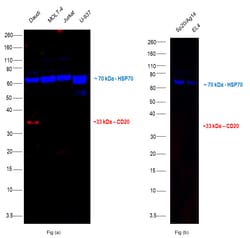Learn More
CD20 Monoclonal Antibody (L26), eFluor™ 615, eBioscience™, Invitrogen™


Mouse Monoclonal Antibody
$382.65
Specifications
| Antigen | CD20 |
|---|---|
| Clone | L26 |
| Concentration | 0.2 mg/mL |
| Classification | Monoclonal |
| Conjugate | eFluor 615 |
| Catalog Number | Mfr. No. | Quantity | Price | Quantity & Availability | |||||
|---|---|---|---|---|---|---|---|---|---|
| Catalog Number | Mfr. No. | Quantity | Price | Quantity & Availability | |||||
50-245-802
 
|
Invitrogen™
42020282 |
100 μg |
Each of 1
for $382.65
Save 12% Reg : |
|
|||||
Description
Description: The monoclonal antibody L26 recognizes human CD20, a two transmembrane spanning protein found on precursor and mature B lymphocytes. Expression is lost upon differentiation to plasma cells. The levels of CD20 are critical in evaluating maligt B lymphocytes including Non-Hodgkin's Lymphoma, and Acute B cell, Chronic Lymphocytic and Hairy-Cell Leukemias. CD20 plays a role in B cell differentiation and activation. The structure of the protein shows a small extracellular loop with the carboxy and amino termini in the cytoplasmic compartment. The L26 antibody recognizes an epitope in the cytoplasmic domain and therefore requires permeabilization of the tissue for staining applications. Unlike many anti-CD20 antibodies that recognize the extracellular domain, the epitope recognized by L26 will not be blocked by therapeutic antibodies to CD20, like Rituximab. Applications Reported: This L26 antibody has been reported for use in immunohistochemical staining of formalin-fixed paraffin embedded (FFPE) tissue sections (IHC-P). Applications Tested: This L26 antibody has been tested immunohistochemistry on FFPE human tonsil with low pH antigen retrieval. It is recommended that this antibody be carefully titrated for optimal performance in the assay of interest. This product has not been validated for flow cytometric analysis.
CD20 is a non-glycosylated surface phosphoprotein that has a molecular weight range of 33-37 kDa depending on the degree of phosphorylation. CD20 is expressed on mature and most malignant B cells, in a subpopulation of T lymphocytes and follicular dendritic cells. CD20 expression on B cells is synchronous with the expression of surface IgM and it regulates transmembrane calcium conductance, cell cycle progression and B-cell proliferation. CD20 is also associated with lipid rafts, but the intensity of this association depends on extracellular triggering, employing CD20 conformational change, and/or BCR (B cell antigen receptor) aggregation. After the receptor ligation, BCR and CD20 colocalize and then rapidly dissociate before BCR endocytosis, whereas CD20 remains at the cell surface. CD20 serves as a useful target for antibody-mediated therapeutic depletion of B cells, as it is expressed at high levels on most B-cell malignancies, but does not become internalized or shed from the plasma membrane following monoclonal antibody treatment. Diseases associated with CD20 dysfunction include Ms4a1-related common variable immune deficiency.Specifications
| CD20 | |
| 0.2 mg/mL | |
| eFluor 615 | |
| Mouse | |
| IgG2a κ | |
| Affinity chromatography | |
| Antibody |
| L26 | |
| Monoclonal | |
| Liquid | |
| RUO | |
| Primary | |
| 4°C, store in dark, DO NOT FREEZE! |
For Research Use Only.
The Fisher Scientific Encompass Program offers items which are not part of our distribution portfolio. These products typically do not have pictures or detailed descriptions. However, we are committed to improving your shopping experience. Please use the form below to provide feedback related to the content on this product.

